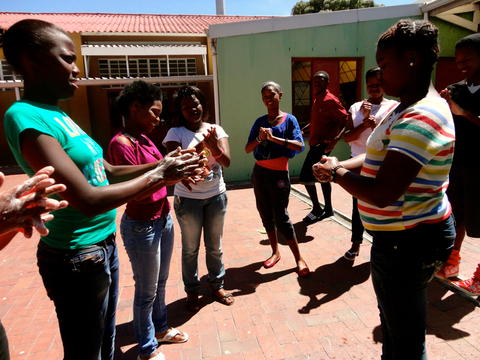
Hi Ikamvanites!
We are two students from Metropol University College in Copenhagen, Denmark, studying a degree in Global Nutrition and Health. Currently we are based in the beautiful Mother City soaking up the summer sun and doing an internship at IkamvaYouth (IY).
For our internship our idea was to teach a series of cooking classes to a group of 15 students at the Nyanga branch to promote health, educational skills and cultural awareness. To our delight IY liked the idea and said that we could join their team for 3 months. How lucky are we?!

Our aim is to explore ideas around culture and food. Some of the questions we asked ourselves were – What is culture? What constitutes as a ‘meal’ in different cultures? Is it meat and potatoes with some veg on the side or is it an open sandwich with a root vegetable topping or some hering? What utensils do different cultures use to eat a meal with – hands, forks, chopsticks, spoons? How is food presented and how does it stimulate the tastebuds visually? Most importantly – how can we push our own boundaries and develop tastes for new and unfamiliar foods?
The idea is to expose students to unfamiliar ingredients as well as showcase how plant-based foods can be used to prepare a variety of imaginative and tasty dishes. On the one hand we are using ingredients that are not always easily available and on the other hand we want to explore how students can enjoy and introduce fresh and healthy, yet affordable foods into their daily diet.
However, at the heart of any cooking classes should be fun and laughter, and this is exactly what we got up to this weekend for our first proper cooking class.
On the menu was fast-food. We made Danish smørrebrød which is a traditional open sandwich, enjoyed by the Danes at lunchtime. We also got our hands stuck into whipping up and rolling some Japanese inspired veggie sushi.
Between the two countries, Denmark and Japan, Denmark came out on top and the students loved the Danish rye bread and toppings. The sushi however received mixed reviews. Some people were close to vomitting, no jokes 🙂 Oh the DRAMA! It was awesome!
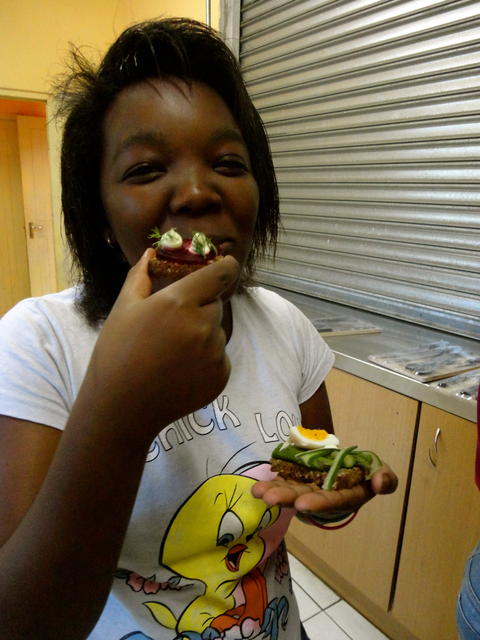
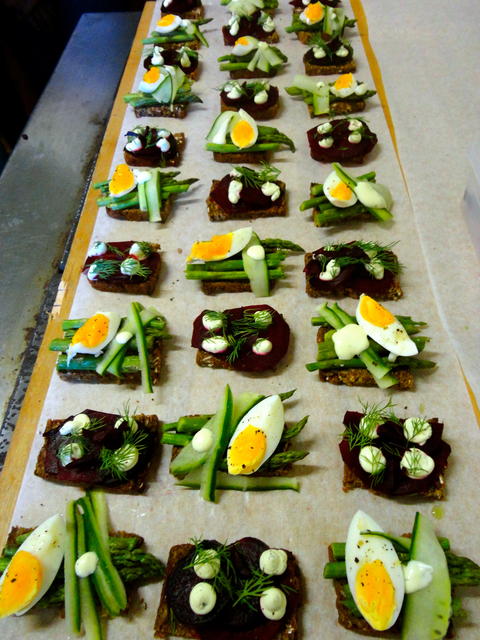
Let’s face it – learning to aquire the taste for the fishy sea vegetable, nori, can take a bit longer than just one afternoon. And then there is the wasabi – the green stuff!! Love it or hate, we had great fun and were all pros at eating with chopsticks by the end of the class.
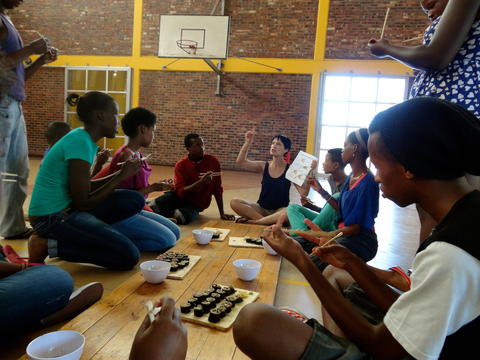
Check out the pics below! The students simply inspired us with their commitment to the task at hand!
One more thing peeps…
We are planning a Yoga & Lunch Charity Event in the Park and YOU are invited!
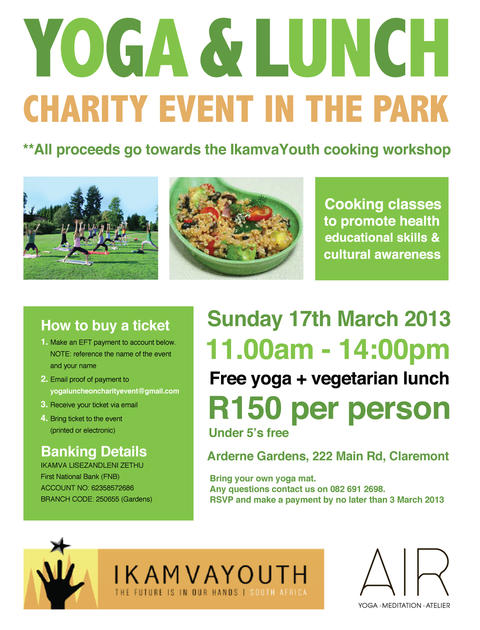
We are hoping to raise R5000. All proceeds will go towards the IY cooking classes.
Like us on facebook: Yoga & Lunch Charity Event in the Park and read the ‘ABOUT’ section for more info OR email us at yogaluncheoncharityevent@gmail.com.
AND please show your support and join us for some socialising and feasting on 17 March 2013. The lunch will be prepared by the students. Our first catering event!!
P.S. Any donations are always welcome and would be much appreciated!
Bye for now 🙂
Jepser & Sharline
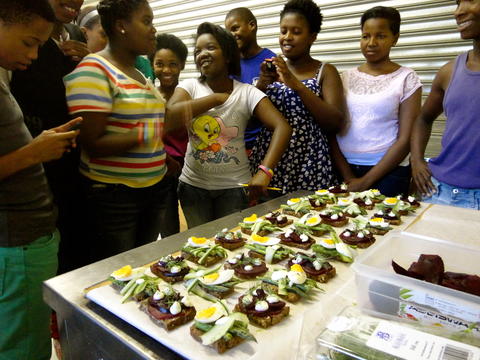
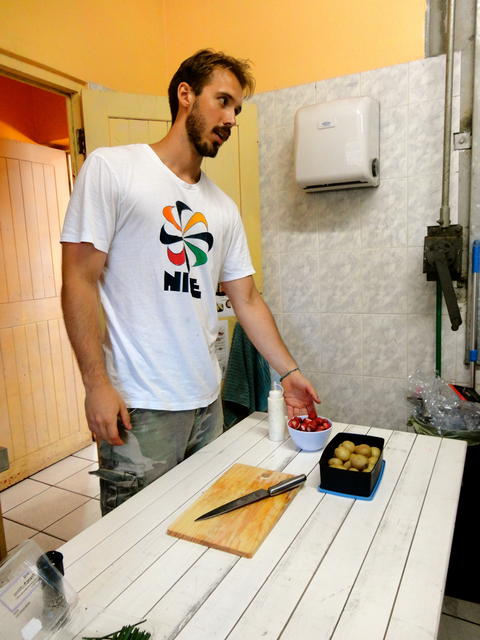
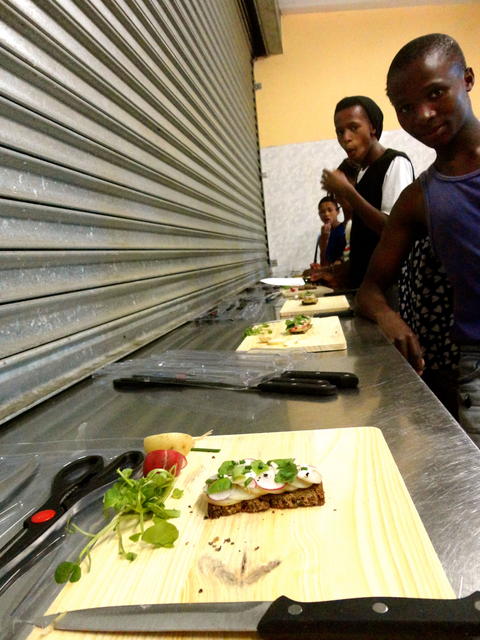
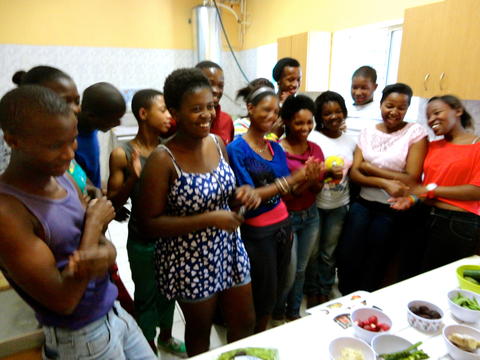

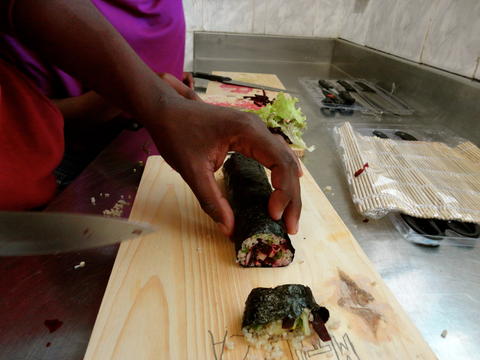

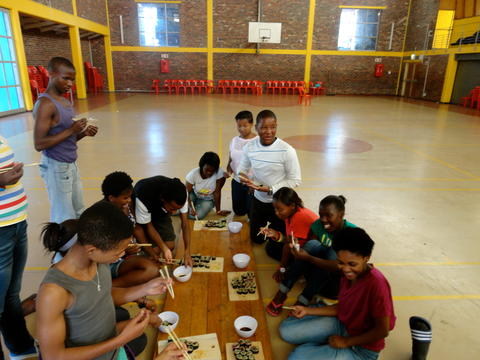
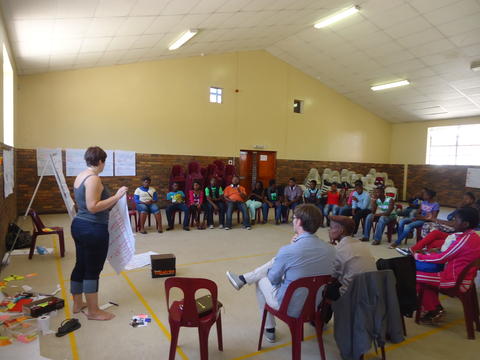

The weekend consisted of planning for 2013 as well as an election to choose the new branch committee as well as choosing the different heads of the different portfolios. Present were more than 30 learners from different grades and tutors and they all had a chance to discuss the decision making, planning and electing the branch committee.
The Main goal of our SPW was to elect a branch committee (in charge of roles and portfolios) and for new volunteers (grade12 from last year returning) to take ownership of programme and become part of the management team. It was also a great weekend for the leaner reps and tutors to get to know each other better.
On Saturday we discussed the year program and we also had a look back at what happened in 2012. The morning started off with an introduction and the group explaining what their expectations of the weekend will be, we then discussed what happened in 2012 and then we ended with looking at what IkamvaYouth is doing well, what challenges we are facing, what IkamvaYouth is offering learners and the community and what we can do to improve the programme. We had a lot of first time branch committee members, but the rest of the group made them all feel included and welcome.
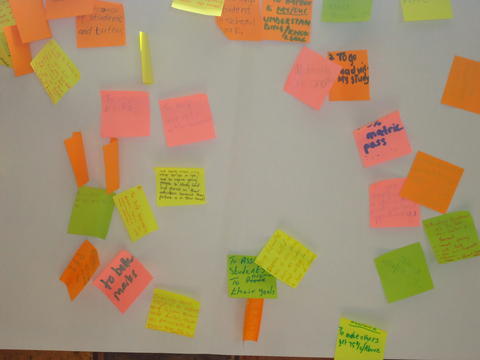
On Sunday the election took place and everyone had a chance to vote for the different nominees. The nomination and election process were very democratic and the nominees had to explain to the group why they were best suited for the different portfolios. The different portfolios were Tutoring, Volunteer Coordination, Career Guidance, Media, Image and Expression, Computer Literacy, Health and Life Skills and Alumni.
The different portfolio members also had to discuss their portfolios and present a plan of action for the group and will need to present this plan of action to all the Ikamvanites at Makhaza. They had to present their goals, when the goals should be reached and by whom. Emihle, a grade 8 learner and newly appointed portfolio member said that the weekend was a dream come true and that she enjoyed the interaction and discussions that took place and that she is really happy and proud for being chosen as part of the health and life skills portfolio.

Mandisi Gladile, a tutor says, “the weekend was really informative and made me realise the value IkamvaYouth adds not only to the learners but also the community and I feel really inspired for the things that we have planned for 2013.”
strategic_planning_week_2013.pdf
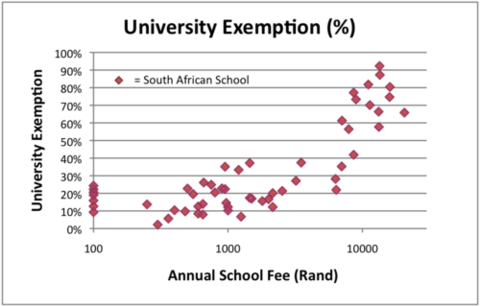
Just over a year ago I was approached by Andrew Einhorn, a UCT grad student, who was interested in implementing an online maths program at Makhaza. All he needed was access to the lab, access to a class and a tutor. A year down the line not only he has completely revamped two of our branches labs in Makhaza and Nyanga, established a formal Khan Academy program in these branches (as well as other locations in Cape Town and rural Eastern Cape), but has produced results at very low costs, and is piloting in schools for 2013.
His passion for creating high impact and stimulating learning environments in township and rural locations often only privy to the wealthy few has seen him start Numeric, an NGO interested in finding ways to bring Khan Academy to South Africa and make it a useful resource to both teachers and learners. He presented an inspiring TEDxUCT talk last year outlining the background, as well as the impact and results Numeric has had. He also posted the following blog on the Khan Academy website:
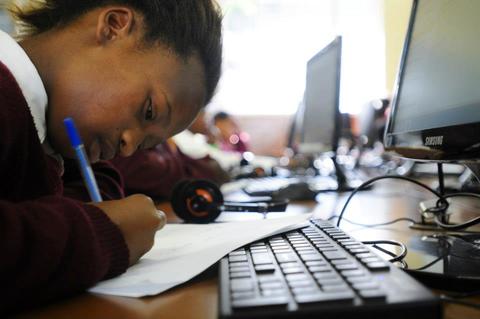
A little over 15 months ago, we started an experiment. We wanted to know if Khan Academy was viable in township (slum) areas in South Africa and if so, what type of impact it might have on numeracy. Numeracy in South Africa is astonishingly weak, with just 2% of Grade 9s scoring over 50% on the annual national assessments in 2012.
And so we set out to see if Khan Academy might be used as a catalyst for change. But before I expound on the results of this experiment, I ought perhaps give a little more background on the environments we’re working in.
Townships in South Africa are not unlike the favelas of Brazil or the slums bordering Delhi and Calcutta in India. They are urban areas that were, until the end of Apartheid in 1994, reserved for non-whites, but have now become residential hubs for the urbanizing masses. They are typically built on the periphery of cities and tend to be characterized by high population density, poverty and unemployment. Picture a ramshackle of makeshift houses constructed out of corrugated iron, wood scraps and cardboard, jigsawed together into a gigantic maze 5 miles wide and 10 miles across. At the risk of generalising grossly, that’s more or less the picture I want you to have in mind as you read this article.
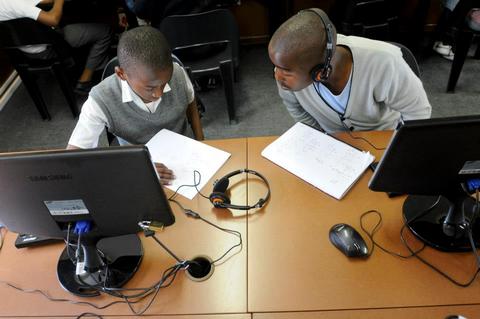
Now, townships in South Africa get a bad rap. They are viewed as ‘dangerous’ places and it is considered unwise to visit them unless you know someone there, or visit them as part of a ‘township tour’. Yet while crime rates in these areas are often high, the reputation does not do justice to the vibrant and persevering people who inhabit them. In particular, townships are YOUNG! On any given day, around two o’clock in the afternoon, the streets flood with uniformed, backpack-toting children on their way home from school. And despite having barely two pennies to rub together, they are meticulously dressed – shiny black shoes, starched white collars – and have aspirations to match. Most of the children in South Africa live in some form of township, which means that children growing up in these environments constitute the better part of the future of our country.
And yet it is supremely difficult to convince our best teachers to go and work in these areas. They are offered good jobs in well-resourced schools most often located in the wealthy suburbs of the cities. Principals at these schools compete fiercely for their skills. And this is as it should be. But it also entrenches the educational bias whereby a child’s access to quality education is directly proportional to the wealth of their family (see chart below).
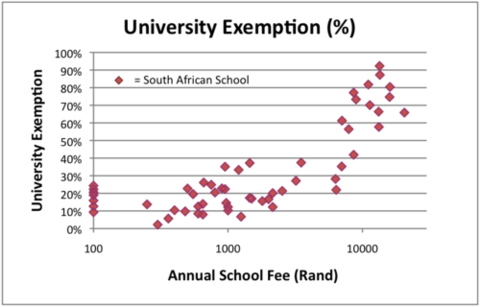
* University exemption rate refers to the percentage of learners who attain the academic marks in their final year of school that are necessary to gain access to South African universities.
So Numeric’s experiment was to see whether we could use Khan Academy, in conjunction with a slightly less skilled (and often unqualified) math coach, to create the high impact and stimulating learning environments enjoyed by kids living in wealthier suburbs.
The opportunity provided by Khan Academy premised on the following: Videos do not argue about where they are played; they are unaffected by crime and environment. Appropriately licensed, they do not cost anything. They do not grow weary, skip class, or grow jaded. Instead, they convey their message enthusiastically, faithfully, clearly – time and time again. A child may watch just as many videos as he/she has appetite for, and need never feel limited by the dragging on of a boring class or an inept teacher. For many children in South Africa, a Khan Academy video will be their first exposure to what we might term ‘world class instruction’. When complemented by the exercises on the Knowledge Map, Khan Academy becomes a powerful tool for turning the tide on numeracy in South Africa.
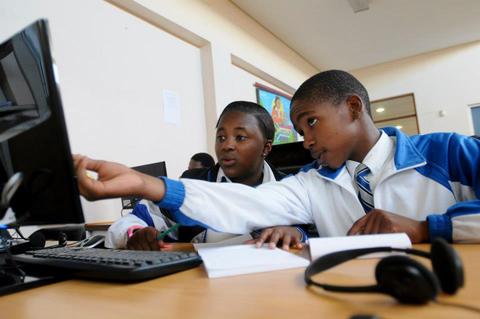
So what were the results of the experiment? Well, it’s probably too early to draw any major conclusions, but we do have a few figures we’d like to share. We currently run 7 Khan Academy classes across 3 different hubs in the Eastern and Western Cape provinces of South Africa. The first pilot group of 20 Grade 9s has just completed its first twelve months of Khan Academy and their numbers are as follows:
* Total Khan Academy hours delivered: 2220
* Total Problems Solved: 27,988
* Total Problems per learner: 1399
* Total Khan Modules Complete: 1232
* Average Modules per learner: 62
Bearing in mind this is an afterschool programme, these are 27,988 math problems that would not otherwise have been attempted. The 62 modules completed by the average learner constitute 62 gaps that those learners have filled. But it’s more about just the numbers; it’s about creating excitement and enthusiasm around learning. This is hard to convey in words, but perhaps a picture will suffice.
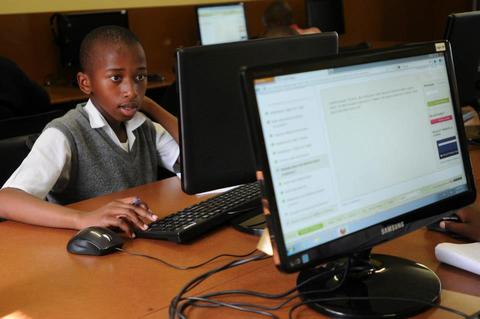
As we always say to our coaches, the tragedy in South Africa is not so much that kids don’t want to learn. It’s that some kids DO want to learn, but can’t. Khan Academy provides us one way to give these kids a world-class education without having to magically replenish our nation’s supply of teachers. And who knows, perhaps one day these kids will become the inspirational and talented teachers we have waited for for so long!
—-
Andrew Einhorn is the founder and current CEO of Numeric.org. His TEDx talk on Numeric.org and Khan Academy is available here.
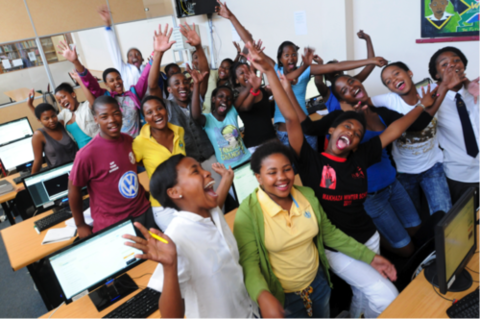

Just over a year ago I was approached by Andrew Einhorn, a UCT grad student, who was interested in implementing an online maths program at Makhaza. All he needed was access to the lab, access to a class and a tutor. A year down the line not only he has completely revamped two of our branches labs in Makhaza and Nyanga, established a formal Khan Academy program in these branches (as well as other locations in Cape Town and rural Eastern Cape), but has produced results at very low costs, and is piloting in schools for 2013.
His passion for creating high impact and stimulating learning environments in township and rural locations often only privy to the wealthy few has seen him start Numeric, an NGO interested in finding ways to bring Khan Academy to South Africa and make it a useful resource to both teachers and learners. He presented an inspiring TEDxUCT talk last year outlining the background, as well as the impact and results Numeric has had. He also posted the following blog on the Khan Academy website:

A little over 15 months ago, we started an experiment. We wanted to know if Khan Academy was viable in township (slum) areas in South Africa and if so, what type of impact it might have on numeracy. Numeracy in South Africa is astonishingly weak, with just 2% of Grade 9s scoring over 50% on the annual national assessments in 2012.
And so we set out to see if Khan Academy might be used as a catalyst for change. But before I expound on the results of this experiment, I ought perhaps give a little more background on the environments we’re working in.
Townships in South Africa are not unlike the favelas of Brazil or the slums bordering Delhi and Calcutta in India. They are urban areas that were, until the end of Apartheid in 1994, reserved for non-whites, but have now become residential hubs for the urbanizing masses. They are typically built on the periphery of cities and tend to be characterized by high population density, poverty and unemployment. Picture a ramshackle of makeshift houses constructed out of corrugated iron, wood scraps and cardboard, jigsawed together into a gigantic maze 5 miles wide and 10 miles across. At the risk of generalising grossly, that’s more or less the picture I want you to have in mind as you read this article.

Now, townships in South Africa get a bad rap. They are viewed as ‘dangerous’ places and it is considered unwise to visit them unless you know someone there, or visit them as part of a ‘township tour’. Yet while crime rates in these areas are often high, the reputation does not do justice to the vibrant and persevering people who inhabit them. In particular, townships are YOUNG! On any given day, around two o’clock in the afternoon, the streets flood with uniformed, backpack-toting children on their way home from school. And despite having barely two pennies to rub together, they are meticulously dressed – shiny black shoes, starched white collars – and have aspirations to match. Most of the children in South Africa live in some form of township, which means that children growing up in these environments constitute the better part of the future of our country.
And yet it is supremely difficult to convince our best teachers to go and work in these areas. They are offered good jobs in well-resourced schools most often located in the wealthy suburbs of the cities. Principals at these schools compete fiercely for their skills. And this is as it should be. But it also entrenches the educational bias whereby a child’s access to quality education is directly proportional to the wealth of their family (see chart below).

* University exemption rate refers to the percentage of learners who attain the academic marks in their final year of school that are necessary to gain access to South African universities.
So Numeric’s experiment was to see whether we could use Khan Academy, in conjunction with a slightly less skilled (and often unqualified) math coach, to create the high impact and stimulating learning environments enjoyed by kids living in wealthier suburbs.
The opportunity provided by Khan Academy premised on the following: Videos do not argue about where they are played; they are unaffected by crime and environment. Appropriately licensed, they do not cost anything. They do not grow weary, skip class, or grow jaded. Instead, they convey their message enthusiastically, faithfully, clearly – time and time again. A child may watch just as many videos as he/she has appetite for, and need never feel limited by the dragging on of a boring class or an inept teacher. For many children in South Africa, a Khan Academy video will be their first exposure to what we might term ‘world class instruction’. When complemented by the exercises on the Knowledge Map, Khan Academy becomes a powerful tool for turning the tide on numeracy in South Africa.

So what were the results of the experiment? Well, it’s probably too early to draw any major conclusions, but we do have a few figures we’d like to share. We currently run 7 Khan Academy classes across 3 different hubs in the Eastern and Western Cape provinces of South Africa. The first pilot group of 20 Grade 9s has just completed its first twelve months of Khan Academy and their numbers are as follows:
* Total Khan Academy hours delivered: 2220
* Total Problems Solved: 27,988
* Total Problems per learner: 1399
* Total Khan Modules Complete: 1232
* Average Modules per learner: 62
Bearing in mind this is an afterschool programme, these are 27,988 math problems that would not otherwise have been attempted. The 62 modules completed by the average learner constitute 62 gaps that those learners have filled. But it’s more about just the numbers; it’s about creating excitement and enthusiasm around learning. This is hard to convey in words, but perhaps a picture will suffice.

As we always say to our coaches, the tragedy in South Africa is not so much that kids don’t want to learn. It’s that some kids DO want to learn, but can’t. Khan Academy provides us one way to give these kids a world-class education without having to magically replenish our nation’s supply of teachers. And who knows, perhaps one day these kids will become the inspirational and talented teachers we have waited for for so long!
—-
Andrew Einhorn is the founder and current CEO of Numeric.org. His TEDx talk on Numeric.org and Khan Academy is available here.

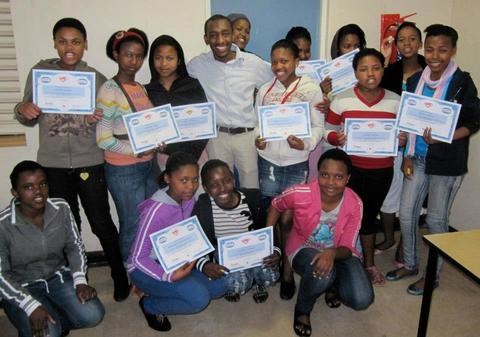

The 1st of December marked world AIDS day, but it was also a day where we honoured our achievers for the hard work they have done during the year. The prize giving was well attended by learners, their families, partners and supporters and IY staff and they bore witness to the great work and sacrifice the learners made and how these sacrifices were converted into achievement. Most of the prizes that were given out were for academic achievement, but we also had prizes for attendance, learners need to be present 75% of the year, and in Makhaza more than 50% of our Ikamvanites had an average attendance of over 90%. This is a great feat as we have tutoring 5 days a week and this dedication just shows how special this programme is to the learners.
Other certificates included the most improved learner per grade, outstanding leadership, learner of the year voted by learners as well as tutors and the most committed learner per grade. 11 learners walked away with computers donated by Capitec, 18 learners received a prize of a day trip with Carl Palmer and others received stationary packs. Our tutors also received certificates and were thanked for their efforts and the time they spent tutoring. The Khan Academy and Marion Walton from UCT also handed out certificates and prizes for the projects they ran during the year.
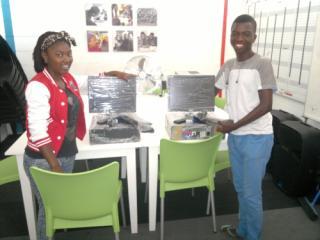
We would like to thank all our partners and supporters, especially Capitec, Numeric, The University of Cape Town, Sinakho high school, Education Without Borders, Carl Palmer, Marion Walton, Andrew Einhorn, Ikapadata , Reel Lives, the Nazeema Isaacs library and staff.
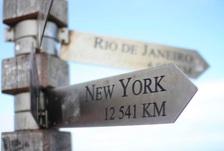
IkamvaYouth has always recognised the importance of creative expression through media; the Media, Image & Expression (MIE) programme was first established at the Makhaza branch in 2006. Over the years, we’ve seen our learners build their identities and self-confidence through various projects and forms of media; from photography and poetry to developing documentaries with mobile phones.
This year, through a partnership with Reel Lives, MIE was taken to a whole new level at Makhaza and Nyanga. Lyle and Leah came all the way from New York City only three months ago, and during this time have worked intensively with six learners to produce amazing films.

It was at the pitch event that we first really realised what they’ve been up to. We weren’t quite expecting such deeply personal stories, and we were concerned for our learners and their families about the levels of disclosure. The small audience of IY staff, partners and filmmakers had the opportunity to engage with the learners. It was remarkable to hear about the positive shifts this process has enabled, and it was humbling to witness the learners’ confident resolve and willingness to share their stories with the world. Kuhle explained that having the opportunity to interview family members and film them with this expensive equipment in his house, gave him the opportunity to be taken seriously and to have conversations he’d been waiting for. The camera was described as both a weapon and a shield.
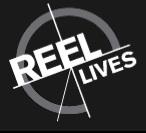
Through their films, our learners faced their greatest fears and tackled their most difficult issues. Nkosazana shares the story of her family, affected by school drop-outs, teenage pregnancy, alcoholism and financial challenges. Ambesa works through issues of abandonment, family secrets and disappointments in her transformational film entitled Ndikuxolele (Forgiveness). In Xola (Peace), Mpumi re-connects with her absent father and rebuilds their relationship and Zintle shares her deepest fears for her safety in There Is No Safe Place. Sinobom confronts her mother when she discovers that she and her sister have different fathers in Mntasekhaya (My Mother’s Child), and in A Closet in Makhaza, Kuhle tells his family that he is gay. Click on the filmmakers’ names and watch their films!
Reel Lives engaged extensively with the learners and their families about which issues to include in the final films and the implications and potential consequences of screening them and uploading them online.
Nevertheless, in the leadup to the premiere we were anxious. On the 24th November, ikamvanites, family members and friends filled the generously availed Labia theatre to watch the films. For many, it was the first visit to the cinema and there was a lot of excitement. The start was a little rocky, with chattering, giggles and popcorn, but as we moved through the films, one could feel the audience shifting and becoming increasingly captivated. Kuhle’s film was the last screened, and the tension from those of us who knew what was coming was palpable. What a way to come out when one comes from a community where homophobia is the norm, and being openly gay puts your safety at risk!
And yet we needn’t have worried. The ikamvanites in the audience went wild with applause, and were then offered an opportunity to speak to the filmmakers who were standing up front. The feedback was powerfully affirming:
“You are our heroes. You guys have such guts. Thank you for being our leaders and our role-models; we are so proud of you. We love you.” IY tutor
Every person in the cinema that day was touched and impressed.
“The day was totally inspirational, a little heartbreaking, and totally amazing. It was one of the most moving I have ever experienced” IY WC district coordinator
“The films were mind blowing, all very touching and so important for healing in our country” Richard Mills, director of Street Talk
Reel Lives’ work is transformational on multiple levels. Our learners have developed impressive skills and experience, by carrying out every phase of the filmmaking process themselves; from story development and filming to editing and subtitling. The high-end professional equipment and software they’ve learned to use not only ensures that the films are gorgeous (what a treat to see them on the big screen!), but that our learners are well-positioned to access scholarships for film school or internships in the film industry.
Our learners’ lives have changed through the process of asking big questions, engaging with their families and tackling their greatest fears and difficulties. The positive shifts in learners’ self-confidence, self-expression and relationships that have taken place over the past months are phenomenal. They’ve re-connected with estranged family members, moved from anger to forgiveness and peace, and bodly declared who they are.
Most transformational of all, however, is the impact these films have on the people who see them. For young people to see films made by their peers, about their communities and the issues that affect their lives is a great opportunity. These brave, open-hearted films will challenge and inspire everyone who sees them. Already, Kuhle has been approached by young gay men who’ve now seen that coming out can lead to community acceptance, support, admiration and celebration.
The transformational impact of these films extends from the filmmakers’ individual experiences to those of their audiences. We’re looking forward to Reel Lives making more films with more ikamvanites at more branches, and to screening these films for massive audiences across the country and the world.
IkamvaYouth sends out a big shout out of thanks and love to the filmmakers and Reel Lives for doing such beautiful work.
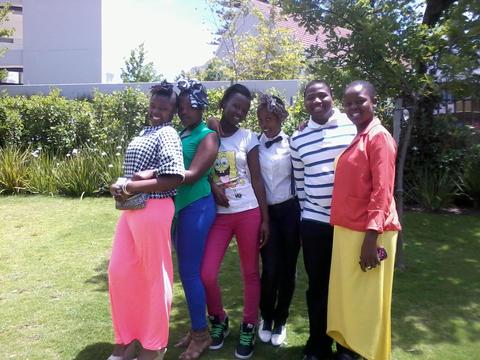































 Lloyd Lungu
Lloyd Lungu